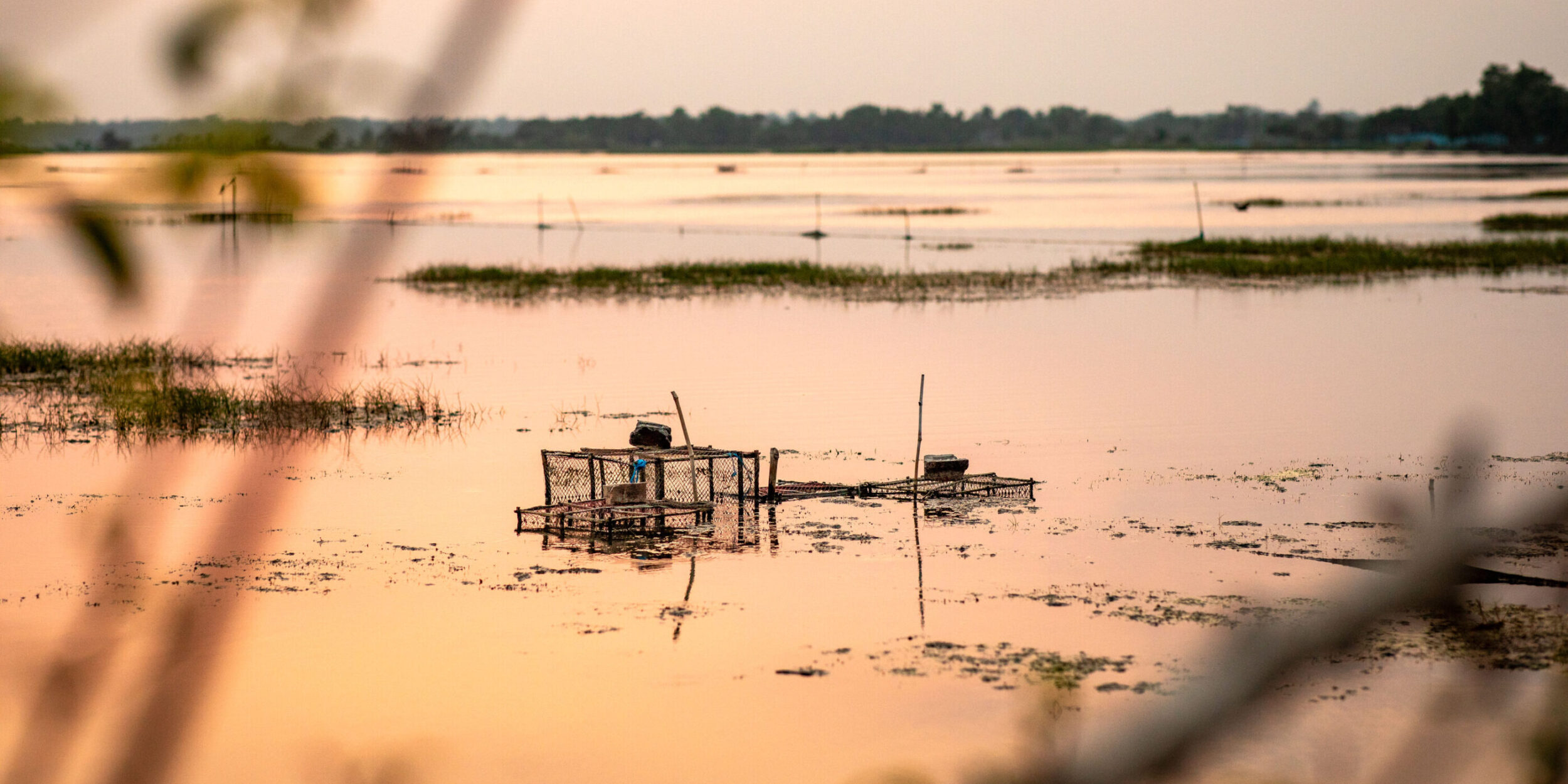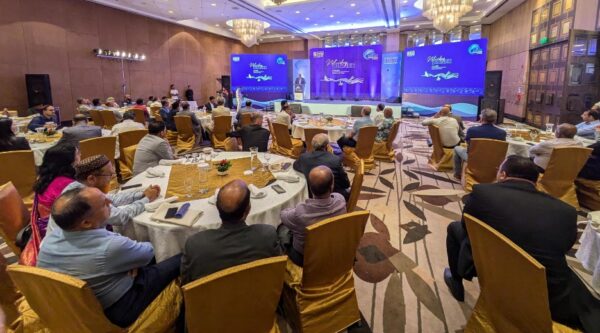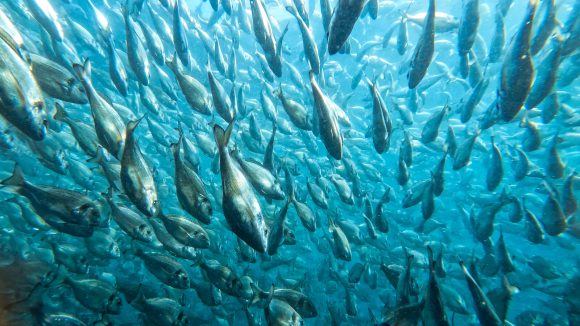
ASC Improver Programme Shines at Bangladesh’s Inaugural Seafood Expo
August 7, 2024
Dhaka, Bangladesh – Roy van Daatselaar, Head of ASC Improver Programme, attended the first ever Bangladesh International Aquaculture & Seafood Show (BIASS) in July and, along with LENK Frozen Foods, presented how the Improver Programme by ASC benefits both farms and communities. The Improver Programme supports farms that are not ready or eligible for ASC certification but are committed to improving their farming practices.

Seafood producers and exporters participate in the first ever Bangladesh International Aquaculture & Seafood Show (BIASS)
In September 2023, in partnership with LENK Frozen Foods and Luna Shrimp Farms, ASC launched its first Aquaculture Improvement Project (AIP) under the Improver Programme in Bangladesh.
125 farmers across five clusters currently participate in the AIP with Luna Shrimp Farms, producing up to 400 kilogrammes of shrimp per hectare a year. LENK is currently initiating a second AIP covering approximately another 275 farmers.
The audience at the expo was treated to a special viewing of an evocative short film, shot by ASC in the beautiful Bangladesh landscape. The film features local farmers from the Satkhira region, who are taking part in the AIP supported by ASC. The farmers describe the improvements they have been able to make following training in applying better practices and the benefits this generates for the local environment, economy and society.
During their visit, Roy and LENK Frozen Foods’ Managing Director Heiko Lenk, spent a few days visiting the farmer clusters involved in the AIP. They discussed progress and any challenges the farmers were facing and were also able to see firsthand the community building and social engagement benefits the Improver Programme brings.
Building a premium brand for Bangladeshi black tiger shrimp
As fisheries and seafood farming sectors make an important contribution to Bangladesh’s economy, harnessing aquaculture opportunities is a top priority for the country. ASC is on a mission to support this goal and improve the seafood farming sector in Bangladesh.
Unlike neighbouring countries in Asia which primarily focus on the production of Pacific white shrimp, Bangladesh’s shrimp production is driven by the traditional, extensive cultivation of black tiger shrimp or “bagda”.

Farmers in Bangladesh focus on the production of black tiger shrimp or “bagda”
Roy said, “The AIP is not only helping farmers improve practices and move to ASC certification, it’s much more than that. Through the AIP and in combination with improvements along the supply chain focused at maintaining product quality, we are aiming to unlock future premium markets for the Luna Shrimp Farms products.
“Such markets would create a better value proposition, opening up opportunities for shared value creation across the supply chain including a better price for the farmers. Black tiger shrimp production is a key contributor to the country’s aquaculture sector and together with our partner Lenk, we believe there is a strong opportunity to build a premium brand around the culture and heritage of extensive, natural black tiger production.”
Supporting shrimp farming communities
Not only shrimp farmers benefit from the AIP – the whole community does too. Many shrimp farmers and their families live in remote areas with limited access to educational materials, transportation and other basic facilities like water supply. People must sometimes walk long distances and queue to get water, and children share scarce supplies and materials in their community school.
Heiko Lenk, LENK Frozen Foods’ Managing Director and founder of Luna Shrimp Farms, said, “Community building and social engagement are part of the work we do for the AIP. When we help the families and the community, we also help the shrimp farmers.
“Recently we renovated a school and we are currently focusing on capacity building for teachers and providing school materials. Outside the school, we built a rooftop above the water well, arranged a hygienic latrine, and donated sewing machines, giving women a purpose and opportunity to generate income and contribute to their families’ livelihood. In the longer term, we are also looking into mangrove reforestation in the area.”
LENK aims to continue community building and ultimately establish the Luna Shrimp Farms Foundation.
“As our shrimp is raised not far from the world’s largest mangrove area, the Sundarbans, known for its ability to protect land and its residents by stabilising shorelines, preventing erosion, and improving water quality, we also want to look into mangrove reforestation in the future. In the end, we hope to function as a role model by inspiring other farmers and industries. Commercially, we seek to develop a higher appreciation for Bangladeshi black tiger shrimp and to enter more markets besides Europe,” Heiko concluded.

Farmers of Luna Shrimp Farms work together to improve farming practices as part of the Aquaculture Improvement Project (AIP) under ASC’s Improver Programme
Speaking about future plans for the Bangladesh AIP, Roy said, “Improvements have to be made both at farm level and in the supply chain, but if we can increase the number of farmers in the AIP from 125 to around 300 or 400, this starts to generate significant business income that will allow Lenk to reinvest some of these revenues back into the community through a charitable foundation Heiko hopes to set up.
“ASC is delighted to work with LENK on these projects as supporting aquaculture producers and their communities is one of the key objectives of our programme.”
About BIASS
By 2030, the BIASS wants to “guarantee Bangladesh’s seafood’s sustainability and improve its standing in the international market, all while earning $5 billion annually from seafood exports from the country.”
Event organiser, Solidaridad reported that there were 54 stalls at the expo, with seven foreign enterprises exhibiting and more than 50 international delegates from 12 different nations taking part.
Solidaridad’s Strategic Engagement Lead for Aquaculture, Moid Uddi Ahmed, said, “The presence of ASC enhanced the show’s worth. The high-level audience was given clear ideas by ASC’s presentation at the plenary session, and these ideas will be reflected in the roadmap.”
“Additionally, the BIASS platform would like to work with ASC to develop and implement the BIASS roadmap in order to position Bangladeshi seafood on the international seafood market sustainably.”
Learn more






